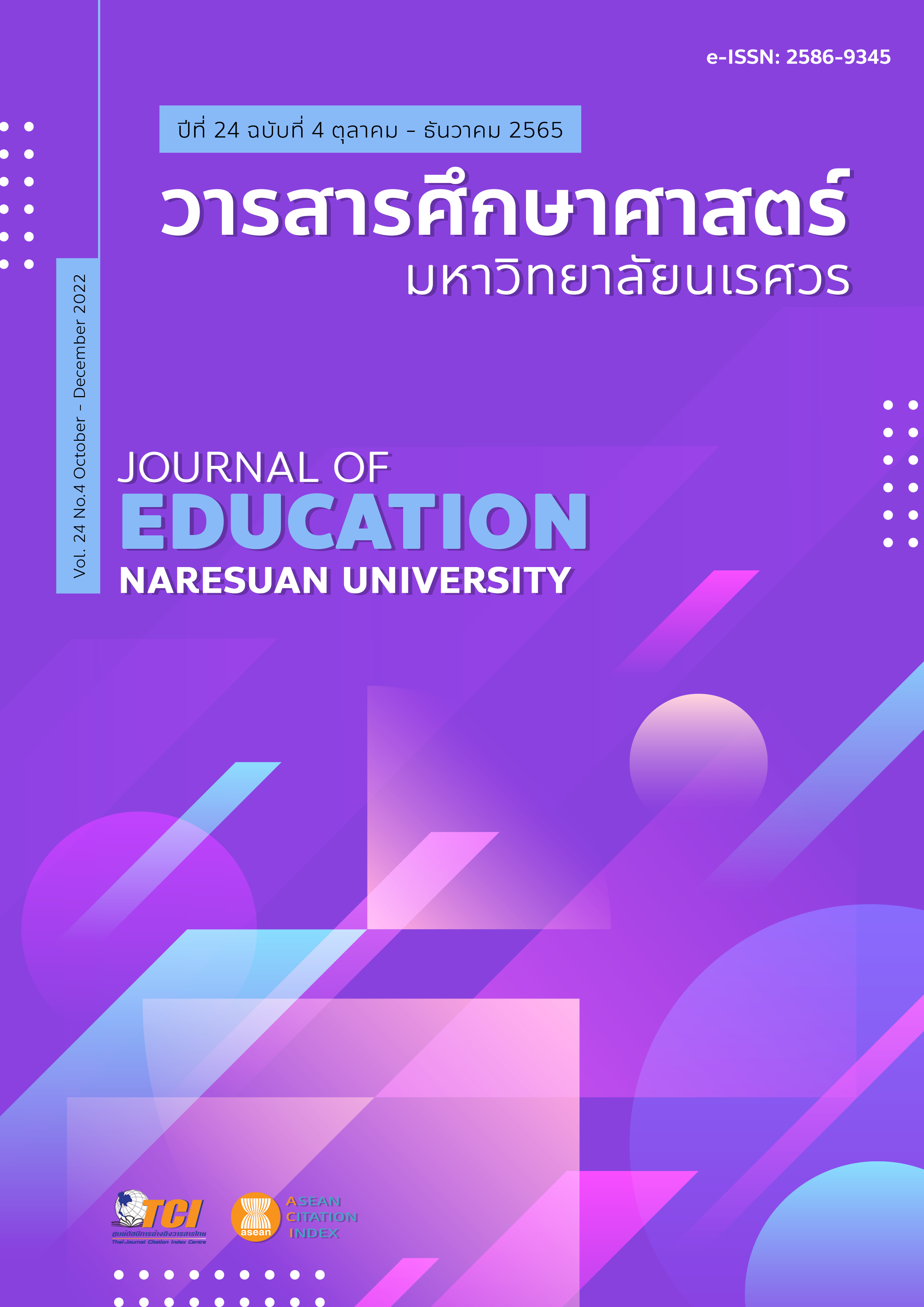THE EFFECTS OF STEAM EDUCATION APPROACH ON SCIENTIFIC CREATIVE THINKING AND LEARNING ACHIEVEMENT ON DNA TECHNOLOGY OF 10TH GRADE STUDENTS ผลการจัดการเรียนรู้ตามแนวคิดสะตีมศึกษาที่มีต่อความคิดสร้างสรรค์ทางวิทยาศาสตร์และผลสัมฤทธิ์ทางการเรียนวิทยาศาสตร์ เรื่อง เทคโนโลยีทางดีเอ็นเอ ของนักเรียนชั้นมัธยมศึกษาปีที่ 4
Main Article Content
Abstract
This research was aimed to study the effects of STEAM education approach on scientific creative thinking and science learning achievement on DNA technology. This research was a quasi-experimental research conducting one group pre-test post-test design experiment and comparing with the set criteria. The sample consisted of 40 students at Banglamung school in Chonburi Province selected by cluster random sampling method. The research instruments were STEAM education lesson plan, scientific creative thinking test and science achievement test in DNA technology. The data were analyzed by mean, percentage, standard deviation, and t-test. The research results indicated that the post-test score of scientific creativity after learning by STEAM education was higher than pre-test scores with statistical significance at .05 and was rated at a good level. The post-test score of science learning achievement after learning by STEAM education was higher than pre-test scores and significantly higher than 60% criterion with statistical significance at .05.
Article Details

This work is licensed under a Creative Commons Attribution-NonCommercial-NoDerivatives 4.0 International License.
The owner of the article does not copy or violate any of its copyright. If any copyright infringement occurs or prosecution, in any case, the Editorial Board is not involved in all the rights to the owner of the article to be performed.
References
Chalermdit, J. (2018). Challenges on augmented reality for education 4.0. Journal of Education Naresuan University, 20(2), 266-279. [in Thai]
Clary, R. M., Brzuszek, R. F., & Fulford, C. T. (2011). Measuring creativity: A case study probing rubric effectiveness for evaluation of project-based learning solutions. Creative Education, 2(4), 333-340. DOI:10.4236/ce.2011.24047
Intavimolsri, S., Kaewdee, S., & Pattaradilokrat, S. (2019). Effects of using education approach in biology on scientific creativity and learning achievement of tenth grade students. Journal of Education Studies Chulalongkorn University, 47(2), 410-429. [in Thai]
Kim, D., Ko, D. G., Han, M., & Hong, S. (2014). The effects of science lessons applying STEAM Education program on the creativity and interest levels of elementary students. Journal of the Korean Association for Science Education, 34(1), 43-54.
Klopfer, E. L. (1971). Handbook on formative and summative evaluations. New York: Addison-Wesley.
Kong, Y. T., & Hu, S. C. (2014). An effect of STEAM activity programs on science learning interest. Advanced Science and Technology Letters, 59, 41-45.
Niamthong, N. (2018). From STEM to STEAM. Retrieved July 2, 2018, from https://www.scimath.org/article-stem/item/7812-stem-steam [in Thai]
Office of the Basic Education Commission. (2010). Guidelines for measuring and evaluation of learning based on basic education core curriculum 2008. Bangkok: The Agricultural Cooperative Federation of Thailand. [in Thai]
Park. H., & Shin. Y. (2012). Effects of science lesson applying STEAM Education on self-Efficacy, interest, and attitude toward science. Biology Education, 40(1), 132-146.
Patrawat, K. (2019). Research shows around the world, found 200 students from Thai children with creativity. Retrieved September 2, 2019, from https://www.komchadluek.net/news/regional/383927 [in Thai]
Ritopas, K. (2018). The Ministry of Education and the mission of promoting learning like steam scientific thinking through art pieces. Retrieved May 21, 2018, from http://www.moe.go.th/moe/th/news/detail.php?NewsID=52662&Key=hotnews [in Thai]
Ruachaiphanich, W. (2016). The concept of Thai education development. Retrieved May 21, 2018, from https://sites.google.com/site/darunsitpattanarangsan/sara-na-ru/khwam-khid-srangsrrkh-kab-kar-phathnakar-suksa-thiy-doy-dr-wiriya-va-chay-phanichy [in Thai]
Tayea, F., Mophan, N., & Waedrama, M. (2017). Effect of STEAM Education on science learning achievement, creative thinking and satisfaction of grade 5 students towards the learning management. Princess of Naradhiwas University Journal of Humanities and Social Sciences, 4(2), 1-14. [in Thai]
Thailand News Center. (2018). Microsoft-IDC research emphasizes creativity as a skill important in the future world that is powered by AI. Retrieved May 22, 2018, from https://www.salika.co/2019/04/05/microsoft-research-ai-creativity-skill/ [in Thai]
Torrance, E. P. (1992). A nation climate for creativity and invention. Gifted Child Today, 15(1), 10-14.
Yakman, G. (2008). STEAM education: an overview of creating a model of integrative education, in Pupils' Attitudes Towards Technology (PATT-19) Conference: Research on Technology, Innovation, Design and Engineering Teaching (Salt Lake City, UT).
Yakman, G., & Lee, H. (2012). Exploring the exemplary STEAM Education in the U.S. as a Practical Educational Framework for Korea. J Korea Assoc. Sci. Edu, 32(6), 1072-1086.


